As an Amazon Associate I earn from qualifying purchases.
Okra happens to be from Africa, and in the Eastern Mediterranean, from Egypt to Greece, it is called bamia. This bamia recipe happens to be Egyptian, but there are lots of variations on how to make this simple, yet satisfying, meat and okra stew.
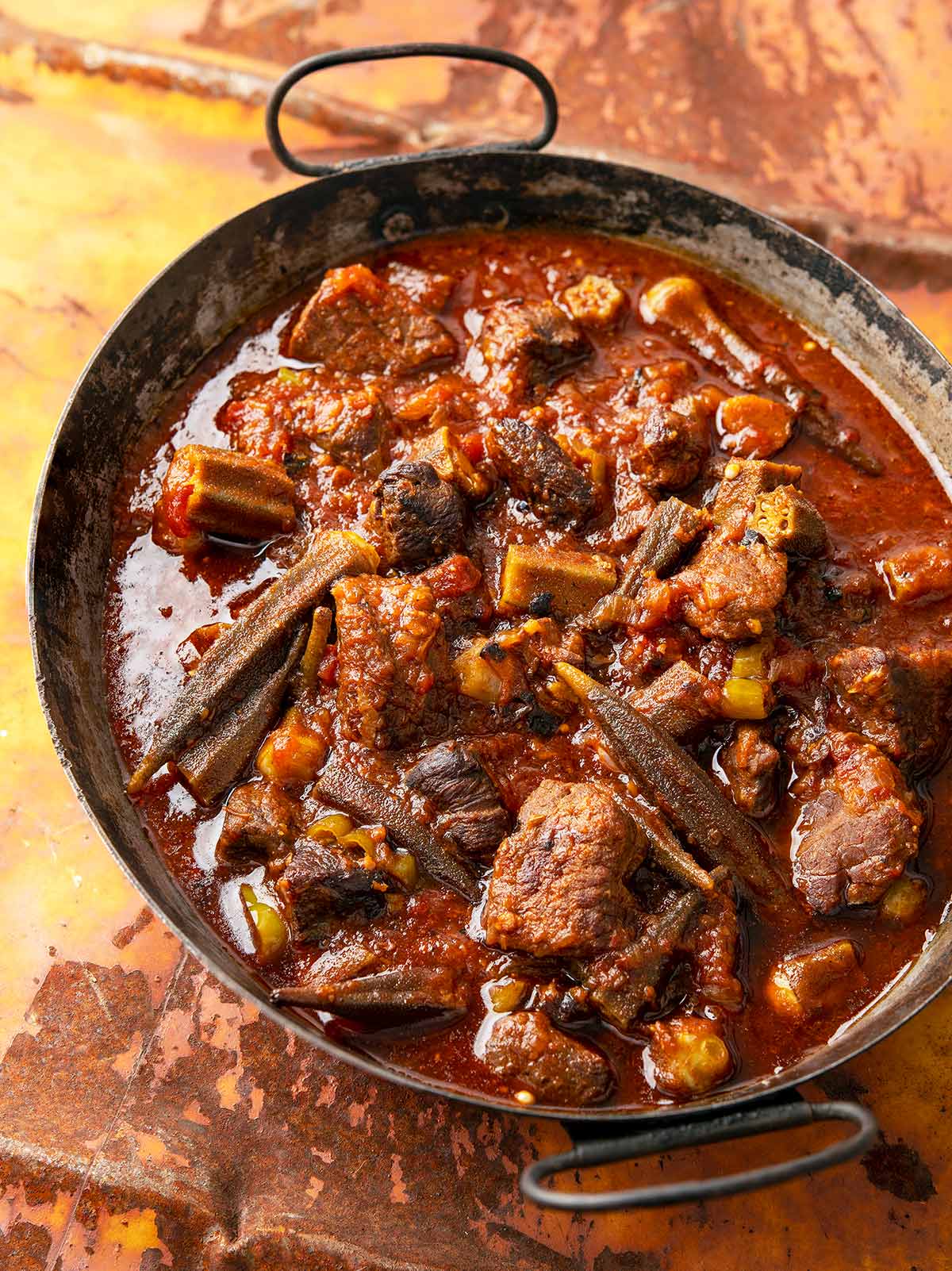
Traditionally, a bamia recipe consists of lamb or goat, lots of tomatoes, and okra. Mine uses venison, but any red meat will do. For that matter, I won’t be sad if you sub in whatever you want, from chicken thighs to rabbit to fish or shrimp.
You might have noticed that my okra looks unusual. It is a red variety adapted to my desert-like conditions called Yuma Red. Any variety of okra will work with this recipe, though, and you can of course use frozen okra or dried okra.
I’ll also let you in on a secret: This okra is not slimy at all. At all. How, you ask? You dust the cut okra right the beginning of your prep with citric acid.
Wait, what? Yes. I learned from an Indian chef, Archna Malhotra Becker, who was cooking alongside me at a Heritage Fire event in Napa recently. She was grilling her okra, but she had dusted hers with powdered unripe mango. Acidity was the key, she said. Not having unripe mango powder, I used Fruit Fresh, which is powdered citric acid. Worked like a charm.
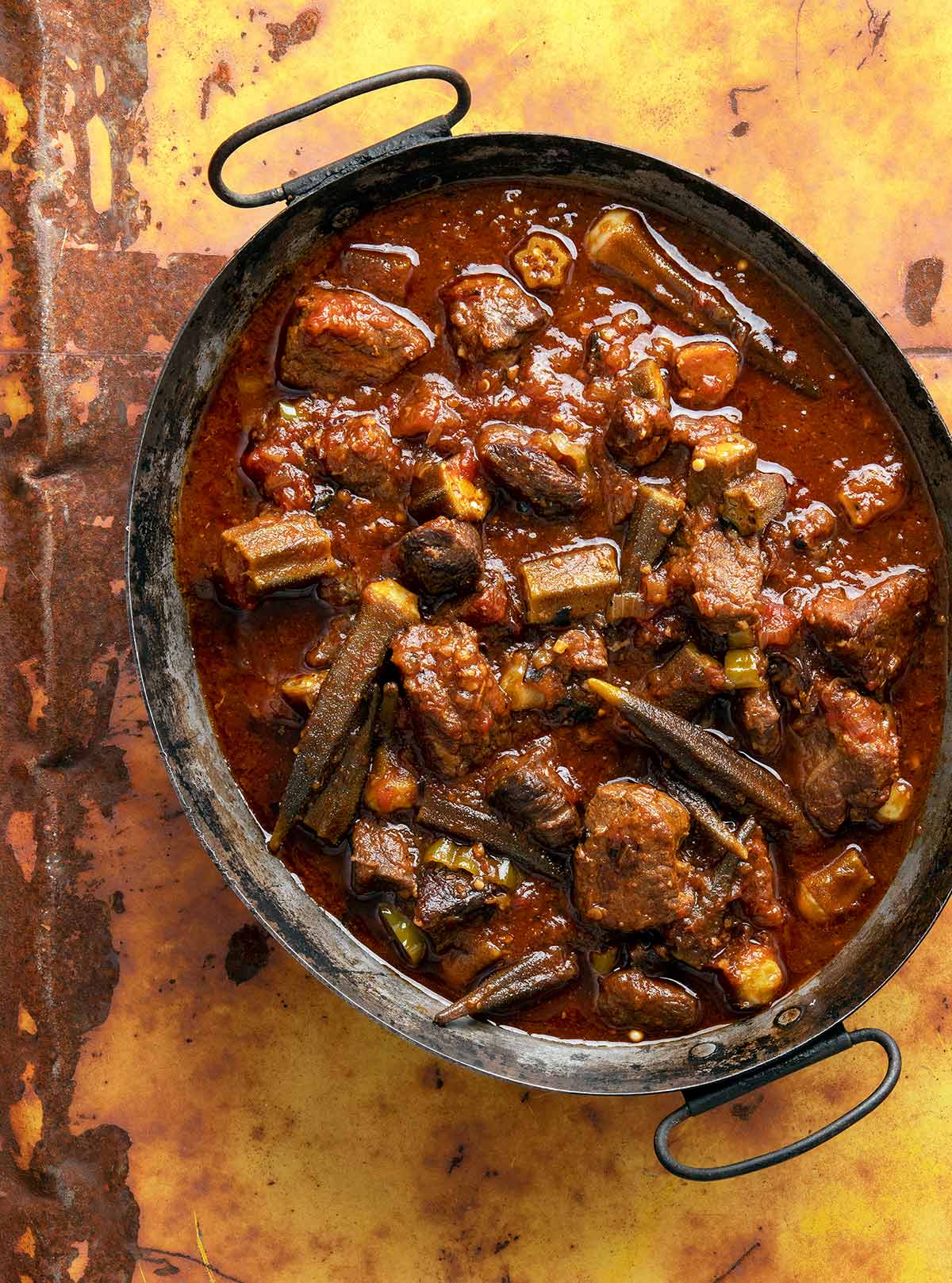
Doing this returns the okra to its place as a nice vegetable in the stew, rather than as a gooey thickener. Either works, so you do you.
My inspiration for this bamia recipe is the great Claudia Roden’s cookbook The New Book of Middle Eastern Food, which I highly recommend. Feel free to add chickpeas or potatoes to give this more heft, although I like it served alongside rice.
I also used homemade venison stock, but if you don’t have any, low-sodium beef stock works fine.
Venison stew meat is my preference here, so use that as a guide if you are not a hunter look for lamb or beef stew meat. Nothing else in this recipe is unusual, except for the dried lemons I use, and they are totally optional.
You can buy dried lemons, or just desiccate some yourself. I keep mine suspended in a mesh bag in my hot, dry garage. They add a powerful lemon flavor, and you don’t eat them — they’re like bay leaves in that they add flavor in the long, slow simmer.
Looking for more okra recipes? Try my Lowcountry Okra Salad, Creole Okra Gumbo, or my West African Okra Stew, which is great served over fried fish.
Egyptian Meat and Okra Stew
Ingredients
- 3 tablespoons olive oil
- 2 pounds venison, cubed
- 2 large yellow onions, chopped
- 2 Anaheim chiles, chopped
- 3 cloves garlic, chopped
- 1 tablespoon ground coriander
- 1/2 teaspoon ground cardamom (optional)
- 2 tablespoons tomato paste
- 2 dried lemons, cracked (optional)
- 1 14 ounce can diced tomatoes
- 1 quart venison or beef stock
- 1 pound okra, sliced
- lemon juice to taste
- Salt and pepper to taste
Instructions
- Heat the olive oil in a large, lidded pot like a Dutch oven over medium-high heat. Salt the meat well and brown it in batches. Pat it dry with paper towels and don't let the pieces touch. You might need to raise the heat to full blast to prevent the meat from steaming. You want it to be well browned on at least 2 sides. Move pieces to a bowl as they brown. This will take you about 15 minutes.
- When the meat has browned, add the onions to the pot. Add a little extra olive oil if you want. Stir the onions around with a wooden spoon to scrape up all the browned bits in the pot. Let them sauté until soft and a little brown. Add the green chiles and the garlic and cook another 2 minutes, stirring often.
- Return the meat and any juices to the pot, add the coriander, cardamom, tomato paste and some salt and mix well. Let this cook a minute, then add the tomatoes and stock. Add the dried lemons if you happen to be using them. Bring to a gentle simmer and taste for salt. Cover the pot and cook for 2 hours. If you are using lamb or beef, you'll only need to cook this for about 90 minutes, or even less.
- When the meat is tender, add the okra and lemon juice. Simmer about 15 more minutes, then add black pepper to taste. Serve with rice.
Notes
Keys to Success
- If you want to de-slime the okra, toss it in a bowl with some citric acid (Fruit Fresh) right at the beginning, letting it sit as everything else cooks. You'll need only about a tablespoon or two.
- Take your time browning the meat. This develops a lot of the flavor, so don't rush things.
- You can add more okra if you want, up to another pound.
- This isn't normally spicy, but I do like a little hot paprika or cayenne in it.
- Once made, this will keep for a week in the fridge. It doesn't freeze well.
Nutrition
Nutrition information is automatically calculated, so should only be used as an approximation.
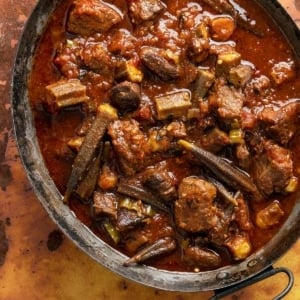
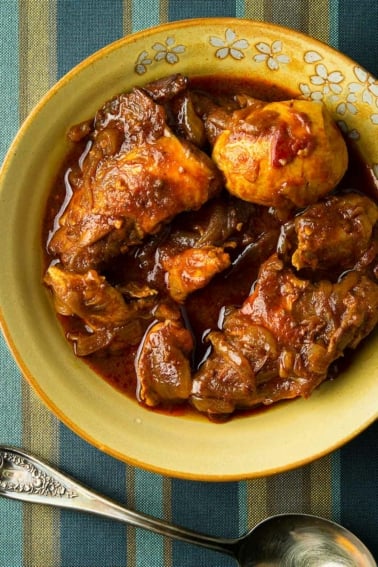
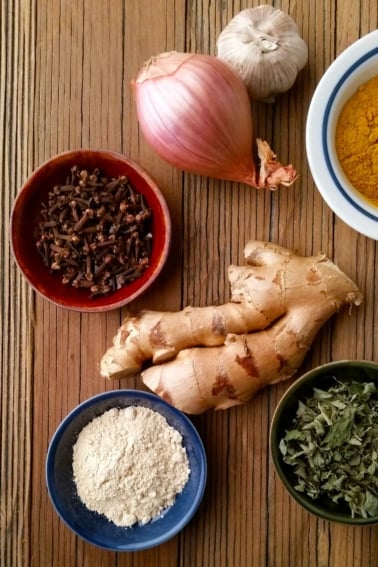


Can I use poblano peppers instead of Anaheim chilies?
Veronica: Absolutely.
Can I use Frozen Okra in this recipe?
Arden: Absolutely. Add them right from the freezer, maybe 15-20 minutes from the end of cooking.
Great trick with the okra and fantastic recipe! Thanks!
Great tip about the acid cutting the okra slime! I have a supply of amchur (dried mango powder) lying around for Indian recipes and will have to try your friend’s original suggestion next time I prep some okra.
I didn’t know this trick about Okra. Thanks to your friend for teaching that simple technique to de-gooefy an otherwise tasty vegetable 🙂
I made this tonight, with my modifications and it was great!
I used okra I grew, some pink and some green. I cubed a venison roast and made dehydrated lemon slices since I couldn’t dehydrate whole lemons. I wasn’t sure how to use citric acid to deslime okra (I don’t mind slime anyway). I didn’t know whether to rinse the citric acid or not, so didn’t.
The acid in the tomatoes will decline the okra. This is one of the secrets to making gumbo. No need for mango powder or citric acid powder.
Ron: I bet you’re right, actually. Hadn’t thought of that.
This sounds great! I was introduced to fried okra at an Army mess hall in Alabama. Loved it ever since!
this sounds amazing but do you want citric acid to help de-slime this or ascorbic acid which is fruit fresh or can we use either?
Darlenee: Fruit Fresh is a mix of both acids, and yes, that’s what you want. Good catch! I will note that it’s both in the post.
Hank,
Is that two entire dried lemons, or two dried lemon slices? Don’t want to make the Chipotle vs can of Chipotle mistake. 😉
Cheers,
Bobby
Bobby: Ha! Yes, two whole ones, but the ones I use are very small, like no bigger than a golf ball. Maybe start with one?
Thanks Hank!
I will be picking the last of my Okra on Saturday – here in North Carolina.
Now I have a killer recipe to prepare it!
Tad
Mom always served slimy okra. I hated it. I’ll have to try it again now!